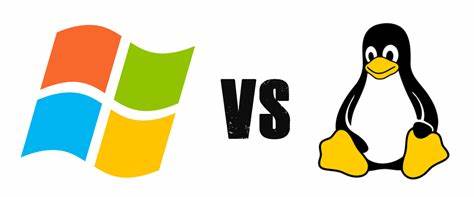
When selecting a hosting solution for your web application or website, providers often present users with a choice of operating systems (OS) to run on top of their hosting products. Among the most common options are Linux and Windows. While Lin is widely popular, there are specific scenarios where Windows hosting might be a more suitable option.
The choice of OS can significantly impact the performance, security, and overall user experience of your web application or website. Therefore, it’s essential to understand the strengths and weaknesses of each option before deciding between Linux hosting vs. Windows hosting.
In this guide, we’ll explore the key considerations for a thorough comparison between Linux and Windows web hosting, assisting you in making an informed and strategic decision.
WHAT IS LINUX HOSTING?
Linux hosting is a type of web hosting that utilizes the operating system to host websites and web applications. Linux is the most widely used server operating system, claiming approximately 80% of the global market share. It is an open-source OS. This means you don’t need to purchase a license to install it on your servers contributing to its widespread adoption over Windows.
Linux server OS commonly powers websites and applications developed using programming languages like PHP and Perl, alongside databases like PostgreSQL, MariaDB, and IBM Db2. It offers a vast array of additional language and database options to suit your diverse project requirements.
Similar to the desktop version of Linux, the server version also features multiple distributions (distros) for you to select from. Among the most popular Linux distros for servers are:
- AlmaLinux
- Ubuntu
- CentOS
- Red Hat Enterprise Linux (RHEL)
- SUSE Linux Enterprise Server (SLES)
- Debian
WHAT IS WINDOWS HOSTING?
Windows hosting involves hosting a website or web application on a server operating system developed by Microsoft. Unlike, which is open-source, Windows is a proprietary operating system and requires you to purchase a license to install it on your servers.
The choice between Windows server editions primarily relies on your specific requirements and hosting budget. The DataCenter edition includes the full suite of features offered by Microsoft, making it an ideal choice for large-scale businesses with extensive data centers.
ADVANTAGES OF LINUX OVER WINDOWS
1.COST-EFFECTIVE
Linux is an open-source server operating system and allows anyone to install it on their server for free. This affordability makes it an ideal choice for small businesses and startups that may not have the resources to invest monthly fees for a server operating system.
2.COMMUNITY SUPPORT
Due to its widespread adoption, Linux boasts a vibrant and extensive community support network than other server operating systems. This community can offer valuable support and resources if you encounter difficulties during server setup or management. For instance, platforms like Quora frequently host Linux-related queries, and numerous free tutorials and courses on Hosting are readily available on platforms like YouTube.
3.SECURITY
It’s inherent design makes it a far more secure operating system than Windows. One of the key factors contributing to Linux’s security is the way it handles user permissions. Unlike Windows, Linux doesn’t execute files without user authorization. To install an application on a server, the server administrator must provide their password. This robust security measure prevents hackers from deceiving the administrator into installing malicious software, protecting sensitive data and maintaining system integrity.
4.RELIABILITY
It servers are widely known for their exceptional reliability and stability. They are less susceptible to random crashes and downtime than Windows and other server operating systems.
5.SCALABILITY
Hosting offers high scalability, allowing you to seamlessly scale up your server resources as your websites or web applications grow. This scalability enables you to cater to increasing traffic demands without downtime or compatibility issues.
6.COMPATIBILITY
It offers compatibility with various software and technologies than Windows and other server OS. This includes control panels, scripting languages like Perl and PHP, and databases like PostgreSQL, MariaDB, IBM Db2, and Oracle Database. This compatibility ensures you can employ multiple tools and technologies to tailor your server environment.
ADVANTAGES OF WINDOWS OVER LINUX
1.EASE OF USE AND FAMILIARITY
Windows is a widely used desktop OS, so most people are already familiar with it. This means there is less of a learning curve for new users, and they can start using their computers without going through lengthy tutorials or training sessions.
Moreover, Windows has a very user-friendly graphical user interface (GUI) that makes it easy to navigate and find the settings and options you need. Linux, on the other hand, is more command-line oriented, which can be daunting for new users.
2.COMPATIBILITY WITH MICROSOFT TECHNOLOGIES
If you use Microsoft technologies such as ASP.NET, MSSQL, or Visual Basic, Window Hosting is an ideal choice. Linux machines do not support some of these technologies, so you will not be able to run your website or application if you choose a host.
Additionally, Windows servers seamlessly collaborate with other Microsoft products like SharePoint and Exchange, making it an optimal choice for businesses relying on these tools.
3.COMPREHENSIVE SUPPORT
Microsoft offers comprehensive support for its Windows Server operating system. This means that you can always get help from Microsoft if you have any problems with your server. On the other hand, it is not as well-supported, and you may have to rely on online forums or community support if you need help.
Furthermore, Microsoft regularly releases updates for Windows Server, ensuring your system remains secure and up-to-date.
4.GAMING
If you want to run games on your server, Windows hosting is the best choice. Windows server is the only operating system that supports NVIDIA Virtual Machine Image (VMI), allowing you to run games on a virtual machine.
Linux does not have good gaming support, and you will not be able to run most games on a server.
LINUX VS. WINDOWS HOSTING: HOW TO CHOOSE THE RIGHT ONE FOR YOUR BUSINESS?
The following are the factors you must consider when between Linux or Windows web hosting:
1.COMPATIBILITY
Before committing to a server, identify the technologies and tools your website or application requires. This includes databases, control panels, scripting languages, and app integrations. Opting for a server OS that supports all the necessary technologies and tools will streamline your operations.
2.LICENSING AND COST
If you want to avoid licensing fees associated with Windows, hosting is the obvious choice. Linux, being open-source, is particularly beneficial for businesses running on a limited budget for web hosting.
3.EXPERTISE AND EXPERIENCE
Choose a server OS you and your team can proficiently operate without going through an extensive learning curve. If your business has an IT team, consult them before choosing a Linux or Windows web hosting.
4.PERFORMANCE
If you compare performance, Linux generally outperforms Windows on similar hardware. It lightweight and efficient nature contributes to its superior performance. Additionally, scaling up servers to accommodate increased traffic is relatively straightforward.
5.SUPPORT QUALITY
It is hosting relies on community-based support, which may not provide responsiveness and expertise as official vendor support from Microsoft. If you prioritize timely and reliable support, Windows hosting should be the preferred choice.



